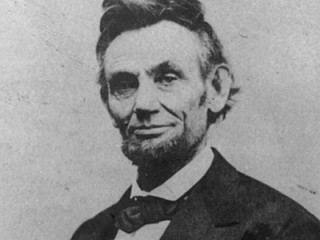
Abraham Lincoln biography
Date of birth : 1809-02-12
Date of death : 1865-04-15
Birthplace : Hodgenville, Kentucky, USA
Nationality : American
Category : Historian personalities
Last modified : 2010-04-23
Credited as : first Republican President of U.S., Great Emancipator, The Confederate States of America
Being born on a farm in rural Hardin, Kentucky didn’t inhibit Abraham Lincoln. Working on his father’s farm and digesting all the literature he could in his spare time, Lincoln’s self-taught education was probably better than anything he would have received at school. And, being born to parents who thought the slave trade despicable, Lincoln’s hard path to abolish slavery in the entire country led him to become the most impressive, well remembered, and perhaps greatest president of the United States of America.
Lincoln had to work twice as hard as someone from a wealthy or well-connected family to attain his post as a lawyer in Illinois, and later as a congressman for the state. Without a formal education behind him, his oratory skills and debates won him national recognition. In his debate with Stephen Douglas in 1858, he won the backing of the Republican Party and a nomination for president. With a drive that knew no limit, he began his crusade to become the first Republican President of the United States.
When a group of Southern States seceded from the Union States to create The Confederate States of America, Lincoln in his Inaugural Address states, “In your hands, my dissatisfied fellow countrymen, and not in mine, is the momentous issue of civil war. The government will not assail you.”
With a country on the brink of civil war, Lincoln, with great care and planning, was able to keep the Union States staunchly cemented in their cause, where he called for nearly 100,000 soldiers to fight for the preservation of their country. The Confederate’s attack on Fort Sumter was the final straw that led the United States to war.
In 1863, Lincoln issued the Emancipation Proclamation and the 13th Amendment to the Constitution of the United States that declared all slaves free men. With the end of the civil war in 1864, Lincoln was re-elected president for a second term. His southern re-building efforts, to this day, have gone down in history as amazingly generous, allowing time to heal, and encouraging southerners to move ahead with the all the great prosperity and liberties they had enjoyed before.
During Abraham’s terms in office, he set up the Department of Agriculture, the income tax, started the transcontinental railroad, and set up a model that influenced the operation of all State-run universities.
With a continued fervor of re-building the United States, Lincoln continued his second term in office. However, upon a visit to the Ford’s Theater in Washington, D.C., John Wilkes Booth shot Abraham Lincoln at point-blank range. Booth escaped, but 12 days later was hunted down by federal agents and shot. After nine hours in a coma, Abraham Lincoln passed into history as the savior of the United States and ultimately as the “Great Emancipator” of slavery.
















